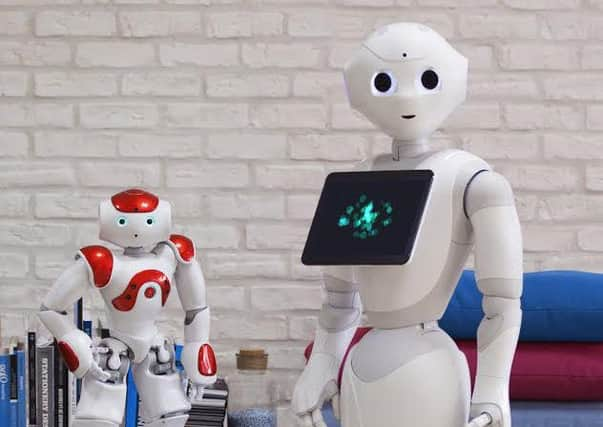Robotic trials to ease health care burden


Researchers believe “culturally aware” robots could help care for the nation’s growing ageing population, as trials begin to see if robots can help people take their tablets and relieve loneliness by offering companionship.
Professor Irena Papadopoulos, expert in trans-cultural nursing at Middlesex University, said: “As people live longer, health systems are put under increasing pressure. In the UK alone, 15,000 people are over 100 years of age and this figure will only increase.
Advertisement
Hide AdAdvertisement
Hide Ad“Assistive, intelligent robots for older people could relieve pressures in hospitals and care homes as well as improving care delivery at home and promoting independent living for the elderly.
“It is not a question of replacing human support but enhancing and complementing existing care.”
The £2m, three-year project is led by teams from Middlesex and Bedfordshire universities and involves specialist researchers from all over the world. Their study will explore how to expand the capabilities of the ‘Pepper’ robot, which has been developed by global humanoid robots designer, Softbank Robotics.
Prof Papadopoulos added: “We are starting with care homes and with people who are semi-independent living in sheltered housing, but we do believe that in the future the robots would become acceptable for people to have in their own homes.”
Advertisement
Hide AdAdvertisement
Hide AdThe professor’s confidence in robotic technology to deliver benefits to health care is shared by Dr Abbas Dehghani, of Leeds University’s school for mechanical engineering.
The £4.3m National Facility for Innovative Robotic Systems opened at the university in 2014 and an ongoing project is looking at the development of robotic suits for elderly people to help them to walk with less difficulty.
Dr Dehghani said the current rate of advances in robotic technology was leading to demonstrable results.
“Robotics is developing really rapidly, not just in the UK but around the world,” he said.
Advertisement
Hide AdAdvertisement
Hide Ad“The NHS has a growing, aging population to support and the cost of doing so is increasing. Having these robotic devices will support the elderly and relieve the burden on the NHS.”
Dr Dehghani added: “We are doing some research in terms of robotics to support living, such as robotic suits and exo-skeletons to help elderly people live more independently but it is not at a level yet that can be used by elderly people.
“These are the solutions for the future but some solutions are already happening. For example, robotic devices are helping physiotherapy application - in a supporting role, not replacing physiotherapists.”
In the absence of immediate robotics solutions for other health care needs, the National Institute for Health and Care Excellence has today issued new guidance which recommends that over-65s should be regularly asked whether they have suffered from a fall when they visit their GP.
Advertisement
Hide AdAdvertisement
Hide AdProf Cameron Swift, who helped develop the standards, said effective measures are now known to reduce the risk of falls, maintain independence and promote ongoing health.
Every year, around 255,000 older people are admitted to hospitals in England due to falls.